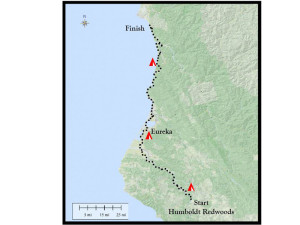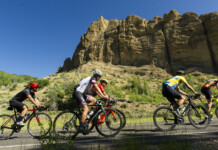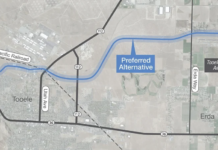
park on Day 1.
By Patrick Walsh
Big trees and coastline were all we had thought about while planning months before, but I drove away from Reno single-mindedly thinking about escape. The billowing smoke that had plagued us for a month had begun to feel like a prison. Two fires, first the American Fire and then the Rim Fire, made Reno unbearable for half of the 2013 summer. Daily health warnings indicated that we should not really go outside and certainly not exercise outdoors. Luckily, we had scheduled a tour in California Coastal Redwoods Parks during the worst of it. The start could not come soon enough. We fled town the minute my riding companion Geoff Rawling landed with his new Surly LHT Deluxe. I had packed the car with almost enough tools to start a bike shop, and he did his assembly in a Forest Service campground near Lassen National Park. I fell asleep listening to light rain patter on the leaves and tent, imagining it putting out the fires and cleaning the air.
We started the tour in Humboldt Redwoods State Park on the Avenue of the Giants, gawking at big trees and gliding on the flat, quiet road that snakes for 30 miles along the valley floor. After our long drive and only a few miles riding, we almost grabbed a scenic stealth camping spot next to the Short Fork Eel River, but a sign warned of poisonous algae. We could have filtered but decided to continue to an official camp site, where we learned that California State Park campgrounds rent bike-in campsites for $5, although per person vs. per site seemed dependent on the camp host. More importantly, they have clean water and showers.

where hiking-only singletrack begins. The view was worth the extra hill.
This state park, established in the 1920s, contains the world’s largest old growth coastal redwoods forest, providing cool shade and relaxed riding. The park museum was a great stop with an excellent natural history exhibit and the Travel Log, a restored mobile home carved out of a single tree in 1917. We also learned about the Save-the-Redwoods League, who helped to establish this and other California Redwoods State Parks. They pushed to prevent clear-cutting of the remaining coastal redwoods at a time when they were being wiped out.

Our quiet soon came to an end as we entered Highway 101. If you have ever driven down this highway in the summer you have seen bicycle tourists in relatively large numbers. Many are from Europe, including a Swiss fellow we met who had started in Anchorage and was excited that he was so close to his trip’s completion in San Francisco. In all of our tours we have never seen so many bicycle tourists. A farm stand operator explained that we were riding against the grain as most bike tourists travel north to south. After Avenue of the Giants, a funny thing happened every time we got away from 101 – the cycle tourists disappeared! It is impossible to bicycle-traverse this part of California without using 101, but I had mapped our route to avoid it as much possible, planning to frequent quiet farm roads. Listening to trucks roaring by while I changed a tire just beyond our first onramp strengthened our resolve to escape from 101. We quickly agreed to add singletrack in the northern parks to avoid traffic as much as possible. The risk was that we had not researched the new paths. We just picked them from the map and decided that this gamble would be preferable to hearing semis whiz by at 70 mph. This route change, which would start a few days later in Prairie Creek State Park, turned out to be pivotal in pushing a good bike tour into a great adventure.
North of Rio Dell, we rode through dairy farms surrounding Victorian houses, and the few vehicles that passed were tractors and farm trucks – no bikes and no cars. We had to get back on 101 to get to Eureka where I made the mistake of trying to confirm that our intended campsite was open. What reviews I accidentally found about the Samoa Boat Ramp were awful-to-disgusting descriptions of camp conditions – how had I missed these during planning? We decided to grab a motel because we were not sure we could find a stealth site so close to town. Lost Coast Brewing was a nice change for dinner before exploring the beautiful Victorian downtown. Apparently, so many of the old “painted ladies” are preserved because this town never had a major fire as so many other old western towns did.

Giants.
We rode over bridges to Samoa peninsula (where it turns out we definitely could have stealth camped) and on through more farms before getting on the paved Hammond Trail. This was our introduction to the Coastal Trail, and it was everything we hoped it would be with ocean views, few other path users, and no cars allowed. It started with a cool old railroad bridge with stencil graffiti of Bruce Lee and Boba Fett. From there the path headed straight northward to Clam Beach State Campground, and eventually we were forced back onto 101 but only for one exit. From there the Scenic Road to Trinidad was spectacular with the sun highlighting sea stacks as it shone through breaking-up clouds and fog. We snacked at an overlook with the sound of waves crashing along the coast before landing in Trinidad for lunch. We elected to eat our road rations at the lighthouse, but we couldn’t pass up the coffee at Beachcomber Café. It was well worth it, fueling us all the way up Patrick’s Point Drive. We considered staying at Patrick’s Point – it it is my namesake after all- but it was early. We decided to press on to Gold Bluffs Campground in Prairie Creek Redwoods State Park.
Our last real highway foray, almost 15 miles of 101, was trying. I expected the four-lane stretch to be unpleasant – a ghost bike memorial reminded us of the possibilities – but it turned out those were the best part of 101. The two-lane sections have no shoulder, and drivers have nowhere to go. We pedaled our fastest to get through it. Wild blackberries (and survival) were our reward soon after turning onto the dirt Gold Bluffs Road. The campground was the ultimate prize, though. The camp host told us that every morning there was a shuffle as campers with ocean views headed home.

Campers without views move in, and by 10:00 am, the ocean view spots are resettled. We stayed 2 nights so that we could hike the Miners Ridge Trail and loop down through Fern Canyon. The old-growth trees on this nine-mile hike were the biggest we saw, and the forest was silent when we stopped to rest. Fern Canyon is unreal with 30-foot vertical walls covered in ferns that almost glow as they filter what sunlight makes it to the canyon. We also could not stay forever and headed north on the Coastal Trail Gold Bluffs Beach Section, this trip’s first adventurous singletrack on loaded bikes. The trail was perfect except for a few log crossings and one section requiring lowering the bikes down a three-to-four-foot drop. We pedaled as the trail split shoulder-height grass that tugged at our panniers in another area. Needless to say, we were elated. We saw elk, banana slugs and big trees. No people, and more importantly no cars. The ride up the Ossagon Trail was steep enough to be challenging but smooth and rideable. Short wood bridges and Jurassic fauna provided the interest; I think this park is underrated for beginner to intermediate level mountain biking, a great detour for us.
Slightly farther north, the paved-but-gated Coastal Drive connecting Prairie Creek State Park and Redwoods National Park had expansive coast views, especially as we approached the mouth of the Klamath River. After crossing the bridge, we stopped in the Log Cabin Diner for excellent biscuits and gravy with eggs and bacon for lunch and rode with full stomachs up a huge hill to get to the start of the Coastal Trail Hidden Beach Section. The view back toward the Klamath River was even better than it had been on the south side. Unfortunately, despite having asked a state park ranger about riding this section of trail, the Hidden Beach Section is off limits to bikes because it is in Redwoods National Park. So, we had to retrace our steps with a big downhill and hop back on 101 for a few miles.

pavement here.

day’s ride at the Carson
Mansion in Eureka, CA.

Later that day, and fifteen miles from the planned end of tour, our ride ended abruptly on the steeper singletrack of the Coastal Trail- Last Chance Section. A log grabbed my front wheel, turned it sideways and tacoed it, and sent the bike and me flying through the air. Geoff, who was riding close behind me, still talks about how impressive an airborn, fully loaded bike looks. Amazingly, my only injury was my ribs, which are still sore five weeks later. I guess I hit them on the handlebars, but it could have been the ground, the seat–who knows? I had to partly carry my bike as I hobbled a mile to Crescent Beach. Luckily, we were near the end of a one-way tour, and our friend David was able to ride in a short distance with an extra wheel so I could ride out. Geoff’s wife Katie was there too, and the four of us had a fun night re-living the trip once I had some Advil, food, and beer. Even with the crash, our last day was the highlight of the tour. We had ridden abandoned pavement on the Coastal Trail where moss and plants made it feel a little like riding through a thin layer of peanut butter with the sun only occasionally breaking through holes in the canopy. We rode smooth, gradual singletrack in Prairie Creek State Park and steep, gnarly singletrack in Del Norte Coast Redwoods State Park. Our escape—from the daily grind, smoke, 101, and tourists—was a roaring success that even a few cracked ribs couldn’t diminish.






